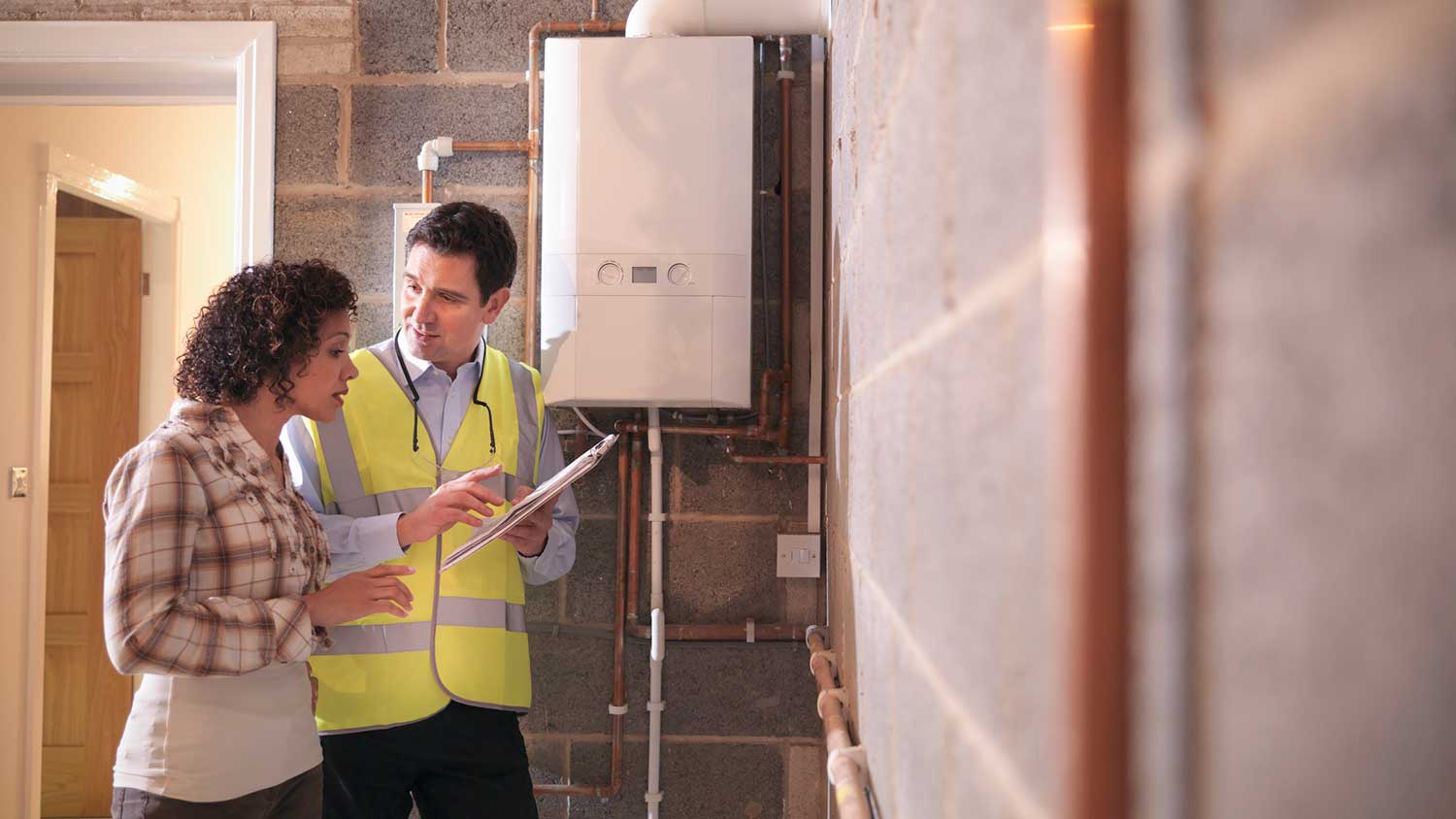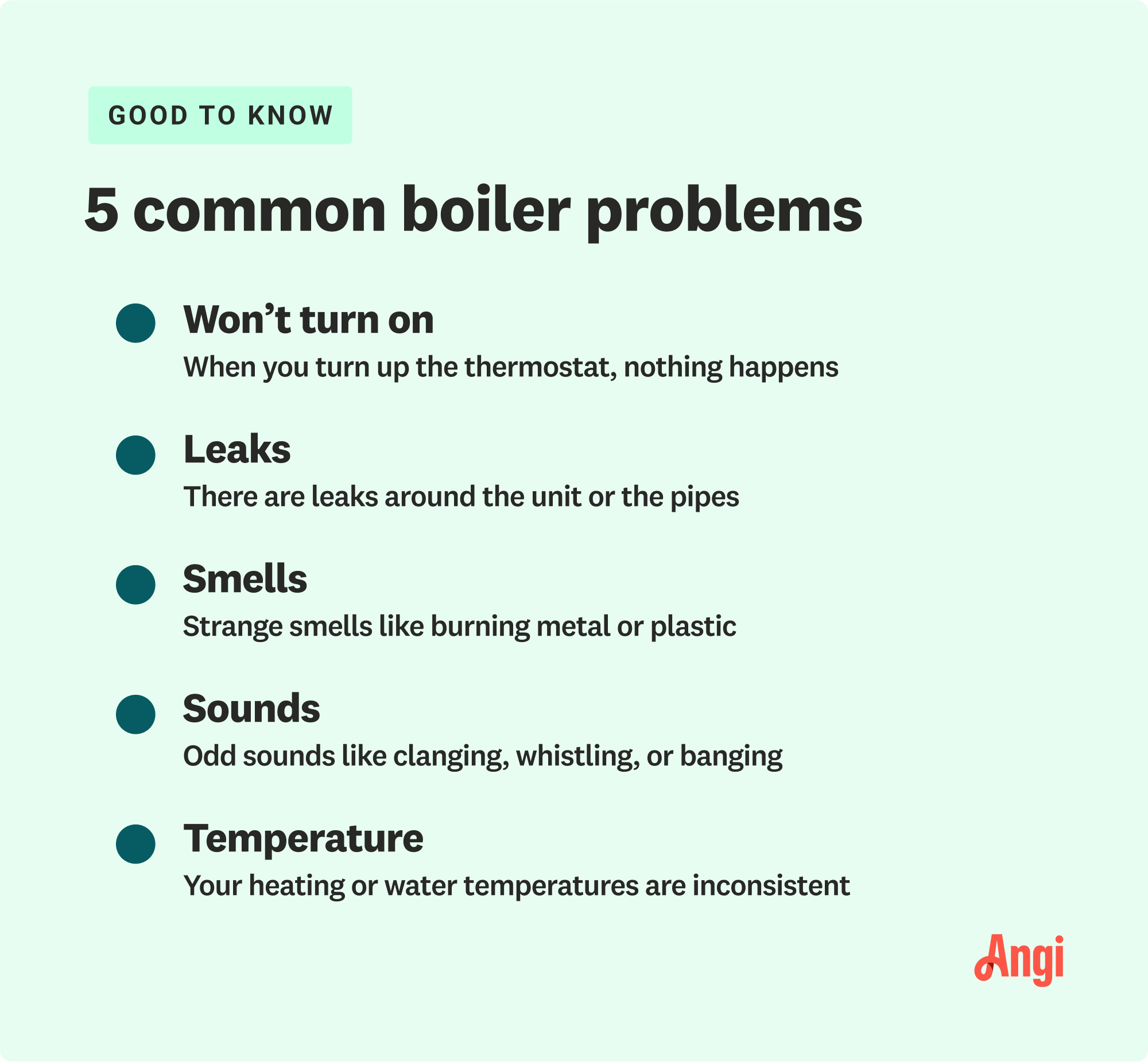When to Replace Your Boiler: Learn About These 7 Signs
Don’t be left out in the cold


Replace boilers that are 15 years old or older.
Constant or serious repairs indicate you need a new unit.
Older boilers can mean no warranty or discontinued parts.
If repair costs are particularly high, consider a new unit.
Wondering when it’s time to replace your boiler? Boilers have a lifespan of 10 to 20 years, and you’ll need to eventually buy a new one. Knowing when to replace your boiler will help you avoid any last-minute scrambles. After all, it’s better to buy a replacement before your boiler breaks down completely and leaves you in the cold—literally.
1. Your Boiler Is Getting Old
The easiest way to know if you need a replacement boiler is by figuring out how old it is. Boilers generally last 10 to 20 years, so if your unit is around that many years old or older, you know it's time for a replacement.
Even with proper boiler maintenance, parts in your boiler can break over time. By replacing your boiler in a timely manner, you can avoid unexpected breakdowns in the peak of winter. The best time of year to get a new boiler is in the off-season when demand is lower and techs’ schedules are less busy.
Moreover, as your boiler gets older, the repairs you need can become more costly. For example, if you need a new coil, circulating pump, or gas valve, repairs can reach over $1,000. When you consider that a new boiler costs $3,700 to $8,300, it may make more sense to put that $1,000 towards the cost of a new boiler installation.
2. Fluctuating Temperatures
A properly working boiler keeps your house—and its running water—at a constant temperature. If you notice that your home’s air temperature is not consistent in different rooms in your house, it may be due to a faulty boiler. The same is true if you turn on the shower and get blasted by a stream of cold water, or if the hot water suddenly runs lukewarm. Temperature issues don’t necessarily mean you need to replace your boiler (it might just need a small fix), but it’s wise to call a pro to find out what’s wrong.
3. Your Boiler Is No Longer Under Warranty
Usually, boiler warranties will cover the cost of replacement parts for 5 to 10 years. This means that while your boiler is under warranty, you'll only be on the hook for labor costs.
But if your boiler is no longer under warranty, then the cost of any repair will be substantially more. If your boiler is no longer under warranty, it's a good time to get a new unit, especially if your current unit needs an extensive, costly repair. Of course, your new boiler will come with a new warranty, so you know that any issues should be fairly manageable.
4. Your Utility Bill Is Going Up

If you notice that your electric bill is going up because of higher levels of energy use, then it might be your boiler's fault (and if you have an oil or gas boiler, you'll want to keep an eye on those bills).
If your boiler isn't working correctly, it'll use more energy to get the job done. The problem might be easily solved with a mineral deposit flush, or you may need to replace your thermostat. However, if the problem is more serious, the repair costs may be high, in which case you may be better off buying a replacement unit.
Also, getting a brand-new boiler may help you lower your bills. Newer models are more energy-efficient than ones that came out a decade ago.
5. Things Keep Going Wrong
There are many reasons why your boiler may be acting up—or perhaps not even turning on. It might be a quick fix, like replacing a bad fuse, or there may be a clogged fuel line or low pressure. Maybe your boiler tech initially found that you needed a new expansion tank, which cost you around $200 to $550, but a while later, your boiler broke down again. Now, it looks like you need a new fan, which will cost $200 to $500. At this point, you’re starting to wonder—what’s next?
When your boiler keeps breaking, it's probably a sign that it's on its way out. While you can choose to keep fixing the problems, it's a good time to stop and consider whether a full replacement is a better bang for your buck in the long run. If you decide to go with a new boiler, a boiler installer near you can help you choose the right one.
6. Requires Discontinued Parts
If you have an older boiler model, there’s a chance that your tech may not be able to find the necessary replacement parts. In some cases, you may get lucky and find a supplier that has the discontinued part in stock or has a refurbished part in stock.
However, if you find out that your boiler parts are discontinued, it’s a good idea to consider buying a new unit. While you may be able to fix its current issue if your tech can track down the part, there’s no guarantee that a different part will be available in the future.
7. Strange Smells, Leaks, and Sounds

There are common boiler issues that may require extensive repairs. In some of the best-case scenarios, you may only need to get a mineral deposit flush, or the part that needs to be repaired is fairly inexpensive. However, the following issues may require costly repairs, and you may need to replace multiple parts.
Depending on the age of your boiler and the extent of the required repairs, it may be a good time to invest in a new boiler if your unit has these problems.

Leaks
If you notice leaks around your boiler unit or the pipes, you need to call in a pro to diagnose the problem. It might be a deposit buildup, or you might need a new expansion tank, valves, pipes, or seals.
Getting leaks fixed right away is important because leaks can cause property damage. Besides potential damage to your flooring and walls, leaks can cause mold. Plus, appliance leaks can lead to corrosion, which can not only build up in your boiler and make it less efficient but can also create holes in the metal. This can all potentially lead to an unexpected breakdown of your boiler.
Strange Smells
If you notice a dusty or burning fabric smell coming from your boiler that doesn’t go away in a day, you should call a pro to check it out. Your boiler will only give off strange smells if something is wrong. In the worst-case scenario, the smell of rotten eggs indicates a gas leak. If that happens, you should leave the house right away and call a boiler inspector as soon as possible. You might also notice a burning plastic or metallic smell, which could mean that circuits or elements inside your boiler are overheating—which is also a good reason to call in an expert.
Odd Sounds
Although your boiler makes sounds when it starts up, runs, and turns off, other strange noises indicate that something is wrong. You might also notice a whistling sound, banging, gurgling, or clunking.
Frequently Asked Questions
If your boiler is 20 years old, it’s time to get a new one. Although it may seem to be working fine, it’s likely eating up more fuel than it should. Also, compared to a brand-new boiler, one that’s 20 years old is probably not working as well. When you get your new unit, you’ll notice that your home is heating more quickly, and the heat is consistent throughout all the rooms.
If you want a new boiler that’s going to help lower your fuel bills, you should buy one that has a high energy-efficiency rating. For example, a boiler that is rated “A” uses at least 90% of the energy created by the boiler. And in order to enjoy the best performance, it’s important to have it installed properly by a highly-rated tech.
All modern boilers are condensing boilers because they’re the most efficient type. Instead of extra heat leaving through the flue, these boilers trap the heat and use it to heat the house. Whether you choose a combi boiler, system boiler, or regular boiler, you can opt to get a condensing system. If you have an old boiler that’s not a condensing boiler, it’s a good idea to get an upgrade.





- Furnace Repair
- Air Conditioning Repair
- HVAC Repairs
- Furnace Installation
- Wood & Pellet Stove Repair
- Dehumidifier & Humidifier Repair
- Heat Pump Companies
- Swamp Cooler Repair
- Wood Stove Services
- HVAC Companies
- Commercial A/C Repair
- Geothermal Installation
- Air Conditioning Installation
- Boiler Repair
- 24 Hour Furnace Repair
- Geothermal Repair
- Heat Pump Repair
- Humidifier Installation
- Thermostat Repair
- Thermostat Installation
- Nest Installation
- Heating & Cooling
- Heating Repair
- Furnace Cleaning
- Furnace Tune-Up
- HVAC Technicians
- Subcontractors
- Furnace Maintenance
- Plumbing & Heating Companies
- Wood Stove Inspection
- Mini Split Installation
- Wall Heater Repair
- Duct Installers
- A Complete Boiler Maintenance Guide for Homeowners
- What Is a Boiler Room?
- How Long Does It Take to Install a Boiler?
- Who Do I Call to Fix My Boiler?
- The Complete Boiler Inspection Checklist for Homeowners
- 11 Boiler Maintenance Tips to Keep Hot Water Flowing Year-Round
- Heat Pump vs. Boiler: Which Is Best for Your Home?
- Water Heaters vs. Boilers: What’s the Difference?
- Boiler vs. Furnace: What Are the Differences?
- Where Should The Expansion Tank Be Installed On a Boiler?















